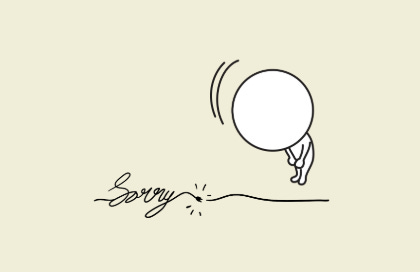There are tons of books written on the art of forgiveness. None on the art of apology.
I wrote a new standup set on friends or the lack of them in my life (hurtful, but comedy gold :-)). One recurring theme that kept coming up in my notes was the concept of an apology!
First, some self-assessment
I am a fairly easy guy in relationships. The people I like consume me. You get my time, attention, and priority. I will not betray your trust. Period.
I’m a low-maintenance bike…
I’m also a bit of a sensitive soul, and I tend to get hurt more than normal people. If there is an issue, I will find it. I am kind of an issue detective!
I have an exceptionally heightened sensitivity to normal (apparently) human traits such as lying, cheating, manipulating, backstabbing, or playing games.
That happens, and everything falls apart.
I’m a low-maintenance bike, but if you take me for a ride, we aren’t completing the journey!
Forgiveness what?
I get the concept of forgiveness. It must be worth practicing if so many books are being written on it. I find it challenging to practice it.
My logic is that if you did something wrong, you did it knowingly. There is no such thing as unintentional backstabbing, unintentional lying, or whatever else hurts the other person. We are not in the 3rd grade anymore; everybody knows exactly what they are doing!
It’s ok to f**k up but admit to it first. Then I will forgive.
If you are talking about forgiving people without a genuine apology, you are essentially talking about forgetting, not forgiving.
The Apology
For true forgiveness to happen, an apology needs to happen first. And nothing screws up a relationship for me like a fuckall apology.
A fuckall apology, according to the latest Morster dictionary, is defined as an apology that is inevitably followed by the dismissive remark, “Hey, I said sorry once; now you decide!”
Dear lord! You say sorry once to someone you bump into by mistake. Not someone you have hurt in a real relationship.
An apology is an act that is unfinished till it is accepted.
You shouldn’t count your apologies or set a limit on how many times you can say sorry. If it truly matters, you do it repeatedly. If not, you would likely blame the other person in the middle of your apology and walk away. There is a difference between being sorry and being defensive.
A token apology is worse than an apology; it’s manipulation.
Newton's 3rd law of motion states that an action has a reaction. He noted it down and published it! He was in a hurry. If he had experimented a bit more, he would have taken his first steps into the field of Psychology also by formulating the First Law of Emotion - An action has a reaction. If that reaction has a reaction, it should be considered manipulation.
When you have messed up, you can’t react to my reaction! WTF!
What kind of apology is “You should understand why I did it”? I don’t understand; that’s why I reacted.
There’s a Japanese art practice called Kintsugi, which literally translates to “filling a crack with gold.” In this technique, broken pottery is repaired by filling the cracks with gold dust, not to conceal them but to highlight them and make the repaired piece even more aesthetically pleasing.
A genuine apology is like that gold.
And you don’t have to be Japanese to fix the cracks in your relationships. You just need to be genuine.
I got a flight to catch. Let me know in the comments section what you think.
Love & hugs
A




I loved the analogy of apology and gold that you've set and loved this whole concept of the art of apologizing. I believe many people will resonate with this.
Reading your serious insights with an occasional pinch of humour is an absolute delight. I am always looking forward to reading your articles, Anshu Sir.
Keep sharing your insights with the Substack community. :)
Bookishly Yours,
Kanika :)
This is gold!